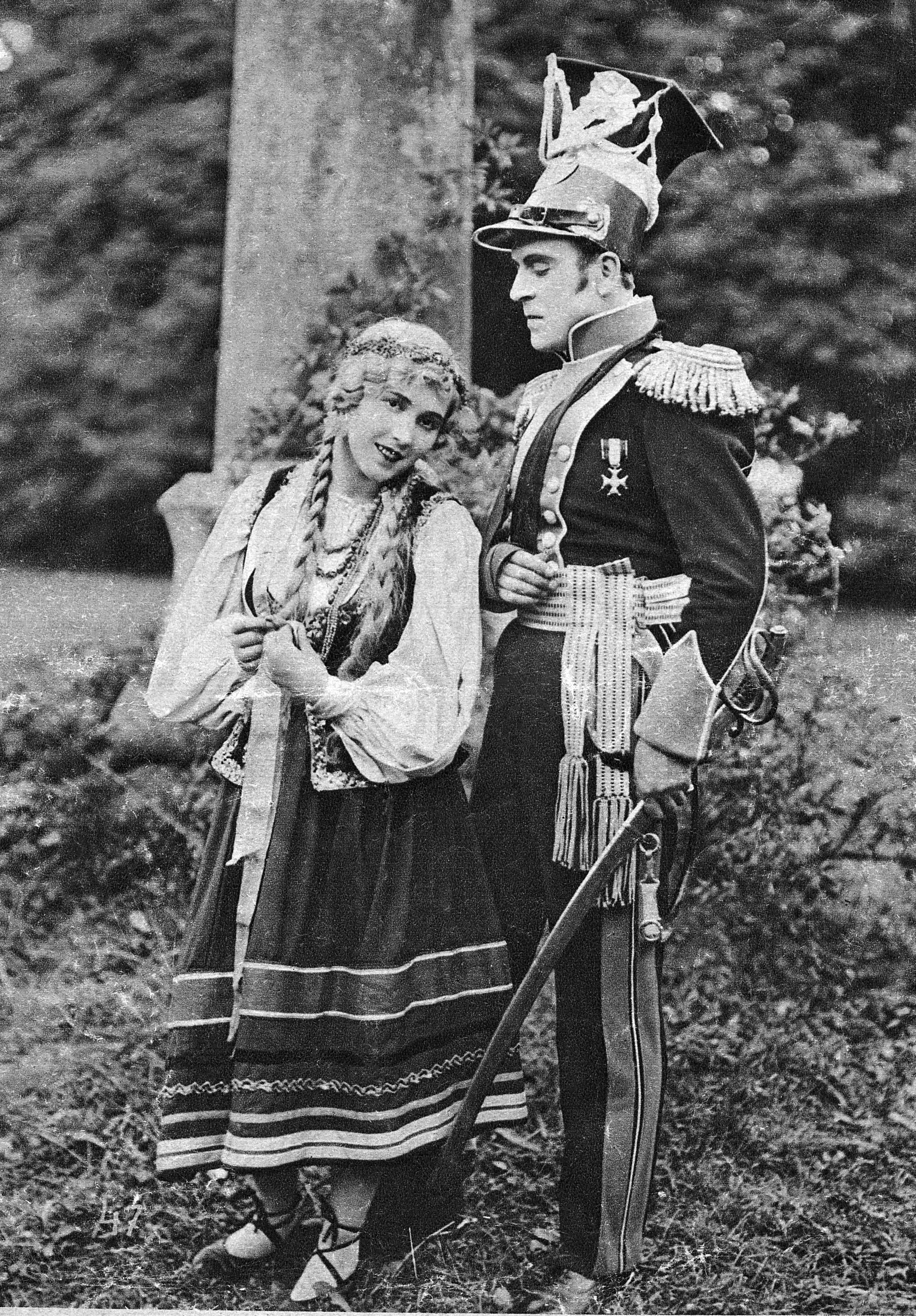Pan Tadeusz (partially lost Polish silent film; 1928): Difference between revisions
mNo edit summary |
No edit summary |
||
| (2 intermediate revisions by 2 users not shown) | |||
| Line 2: | Line 2: | ||
|title=<center>Pan Tadeusz</center> | |title=<center>Pan Tadeusz</center> | ||
|image=Pan Tadeusz (1928).png | |image=Pan Tadeusz (1928).png | ||
|imagecaption=Tadeusz and Zosia | |imagecaption=Still from the film featuring Tadeusz and Zosia. | ||
|status=<span style="color:orange;">''' | |status=<span style="color:orange;">'''Partially Lost'''</span> | ||
}} | }} | ||
'''''Pan Tadeusz''''' ''''' | '''''Pan Tadeusz''''' ('''''Mr. Thaddeus''''') is a Polish silent film from 1928, based on Adam Mickiewicz's 1834 epic of the same title. The film was directed by Ryszard Ordyński, and was written by Andrzej Strug and Ferdynand Goetel. | ||
==Production== | ==Production== | ||
| Line 11: | Line 11: | ||
==Film Release== | ==Film Release== | ||
The official premiere of the film took place on | The official premiere of the film took place on November 9th, 1928 in Warsaw with the participation of President Ignacy Mościcki and Marshal Józef Piłsudski. The newspaper of the time announced ''Pan Tadeusz'' as "a film epic of Adam Mickiewicz's immortal work", an anniversary film, "a superproduction made for the 10th anniversary of Poland's independence". The project proved to be a commercial success for the creators, enjoying great success in the capital. The premiere marked the beginning of celebrations marking ten years of Polish independence. | ||
==Availability== | ==Availability== | ||
For many years the work was considered lost | For many years the work was considered lost, being believed to have been destroyed during the Second World War. Fragments of the film, totalling forty-two minutes in length, would later be found in the 1950s, with further fragments were found in Wrocław in 2006. Thanks to these fragments, it was possible to reconstruct about one hundred and twenty minutes of the film, which originally lasted over three hours. The premiere of this reconstructed version of the film took place in Warsaw's Iluzjon cinema on November 9th, 2012, with it being accompanied with music composed by Tadeusz Woźniak.<ref>[https://www.tokfm.pl/Tokfm/1,103089,12794920,_Niewyobrazalny_budzet__wielka_produkcja____Pan_Tadeusz_.html Article on saving the film during the war.] Retrieved 28 Jun '21</ref> This reconstruction would later be released on DVD by Filmoteka Narodowa in January 2014. | ||
==External Links== | ==External Links== | ||
| Line 23: | Line 23: | ||
*[https://polona.pl/item/pan-tadeusz,ODEyMDMzODc/0/#info:metadata Digital reproduction of the film programme on polona.pl.] | *[https://polona.pl/item/pan-tadeusz,ODEyMDMzODc/0/#info:metadata Digital reproduction of the film programme on polona.pl.] | ||
== | ==References== | ||
{{reflist}} | {{reflist}} | ||
Latest revision as of 01:22, 18 October 2022
Pan Tadeusz (Mr. Thaddeus) is a Polish silent film from 1928, based on Adam Mickiewicz's 1834 epic of the same title. The film was directed by Ryszard Ordyński, and was written by Andrzej Strug and Ferdynand Goetel.
Production
Ryszard Ordyński shot the film, among others, at the Czombrów estate near Lake Świtez, where Adam Mickiewicz, the author of the book, spent his childhood. The set design, costumes and film props were supervised by a team of consultants, and the 1st Cavalry Regiment of Józef Piłsudski and the 4th Regiment of Zaniemenski Uhlans took part in the battle scenes.[1]
Film Release
The official premiere of the film took place on November 9th, 1928 in Warsaw with the participation of President Ignacy Mościcki and Marshal Józef Piłsudski. The newspaper of the time announced Pan Tadeusz as "a film epic of Adam Mickiewicz's immortal work", an anniversary film, "a superproduction made for the 10th anniversary of Poland's independence". The project proved to be a commercial success for the creators, enjoying great success in the capital. The premiere marked the beginning of celebrations marking ten years of Polish independence.
Availability
For many years the work was considered lost, being believed to have been destroyed during the Second World War. Fragments of the film, totalling forty-two minutes in length, would later be found in the 1950s, with further fragments were found in Wrocław in 2006. Thanks to these fragments, it was possible to reconstruct about one hundred and twenty minutes of the film, which originally lasted over three hours. The premiere of this reconstructed version of the film took place in Warsaw's Iluzjon cinema on November 9th, 2012, with it being accompanied with music composed by Tadeusz Woźniak.[2] This reconstruction would later be released on DVD by Filmoteka Narodowa in January 2014.
External Links
- Pan Tadeusz on FilmPolski.pl.
- Pan Tadeusz on National Film Archive "Nitrofilm".
- Stills from the film Pan Tadeusz.
- Digital reproduction of an interview with Ferdynand Goetel on the film on polona.pl.
- Digital reproduction of the film programme on polona.pl.
References
- ↑ Article about the release of the film on DVD. Retrieved 28 Jun '21
- ↑ Article on saving the film during the war. Retrieved 28 Jun '21
